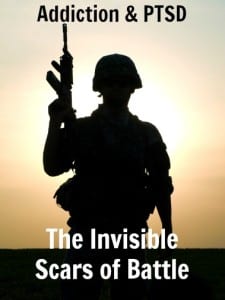 Post-Traumatic Stress Disorder (PTSD) can affect anyone who witnesses or personally experiences one or more traumatic events in their lives. Often we are more aware of the disorder in relation to soldiers’ return from combat. The PTSD Foundation of America says that one in three returning military personnel is diagnosed with serious post-traumatic stress symptoms. Fewer than 40% of them will seek help.
Post-Traumatic Stress Disorder (PTSD) can affect anyone who witnesses or personally experiences one or more traumatic events in their lives. Often we are more aware of the disorder in relation to soldiers’ return from combat. The PTSD Foundation of America says that one in three returning military personnel is diagnosed with serious post-traumatic stress symptoms. Fewer than 40% of them will seek help.
Untreated PTSD can be one of the most emotionally incapacitating mental illnesses. It causes intense anxiety that interferes with day-to-day life. Symptoms can include some or all of the following:
- recurrent disturbing memories of the traumatic event
- re-living the event in flashbacks
- realistic nightmares
- severe reactions to things that remind the person of the trauma
- avoiding all references of the traumatic event
- lost interest in once enjoyable activities
- dramatic mood swings
- trouble sleeping
Unfortunately, many individuals with PTSD may turn to drugs and alcohol as a way to deal with anxiety and numb their pain. Alcohol or drugs may temporarily make a person with PTSD feel better, but often creates more complications, putting individuals and love ones into a dangerous cycle.
Substance use worsens many symptoms of PTSD, including emotional numbing, social isolation, anger, and depression. An integrated treatment approach addressing PTSD and a drug or alcohol addiction simultaneously offers the best chance of success.
It is not unusual for well-meaning family and friends who want to offer support to feel frustrated in their efforts to help their loved one cope with PTSD. They may find it hard to understand what someone with PTSD is going through.
How can family and friends help support the recovery of someone experiencing symptoms of PTSD? Here are a few suggestions:
- Learn about PTSD to better understand what your loved one is going through.
- Allow space for your loved one and let them know that you’re available when he or she is ready to accept your help.
- Offer to attend medical appointments or assist with finding professional help
Successful treatment comes from specialized care that involves family members in the process.
Millions of people and their families are coping with a dual diagnosis of post-traumatic stress disorder and substance abuse every day. If you have worries or concerns about your loved one, or advice for those who are struggling in their journey toward recovery, please join the conversation online.
Share your thoughts or comments below and visit us on Facebook!
Westbridge can help you stay in the race.
Call WestBridge Today 1.877.461.7711.



